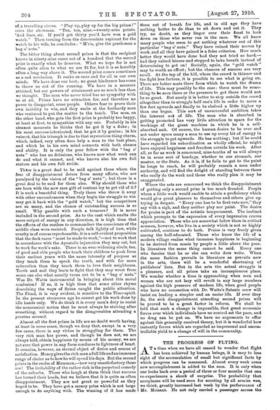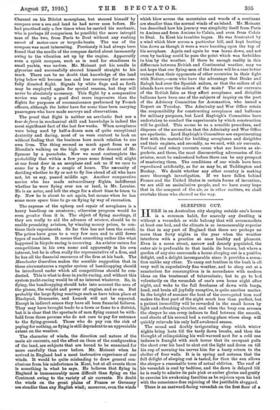Ltth PROGRESS OF FLYING.
AT a time when we have all ceased to wonder that flight has been achieved by human beings, it is easy to lose sight of the accumulation of small but significant facts by which progress can be measured. Almost every week some new accomplishment is added to the sum. It is only when one looks back over a period of three or four months that one re-experiences a shock of surprise. The probability that aeroplanes will be used soon for scouting by all armies was, we think, greatly increased last week by the performance of Mr. Moisant, He not only carried a passenger across the Channel on his Bleriot monoplane, but steered himself by compass over a sea and land he had never seen before. He Lad practisedonly a few times when he carried his mechanic, who is perhaps (if comparison be possible) the more intrepid man of the two, from Paris to Deal without any rushing escort of motor-cars or torpedo-boats. The use of the compass was most interesting. Previously it had always been found that the needle of the compass darted about incessantly owing to the vibration set up by the engine. Apparently even a spirit compass, such as is used for steadiness in small yachts, was useless. Mr. Moisant put his needle in glycerine and successfully steered himself straight to his mark. There can be no doubt that knowledge of the land lying below will become less and less necessary for success- fully directed flight. Signals by white flags and so forth may be employed again for special reasons, but they will never be absolutely necessary. This flight by a comparative novice was really a good deal more impressive than the flights for purposes of reconnaissance performed by French officers, although the latter have for some time been carrying passengers who have made surveys and observations.
The proof that flight is neither an acrobatic feat nor a tour d,e farce in mechanical skill and knowledge is indeed the most significant fact of the last few weeks. When aeroplanes were being used by half-a-dozen men of quite exceptional dexterity and daring, most of us were content to look on without feeling that the business bore much relation to our own lives. The thing seemed as much apart from us as Blondin's walking on the high rope or the descent of Mr. Spencer by a parachute. Now we must contemplate the probability that within a few years some friend will alight at our front door in an aeroplane and ask us if we care to come for a fly for a couple of hours. The necessity of deciding whether to fly or not to fly lies ahead of all who have not, let us say, passed middle age. Another comparative novice who has made extraordinary flights, indifferent whether he were flying over sea or land, is Mr. Loraine. He is an actor, and left the stage for a short time to learn to fly. Now be is about to net again, but means when he has some more spare time to go on flying by way of recreation.
The expense of the upkeep and repair of aeroplanes is a heavy handicap on amateurs ; otherwise progress would be even greater than it is. The object of flying meetings, if they are really to aid the advance, of science, should be to enable promising aviators, by winning money prizes, to con- tinue their experiments. So far this has not been the result. The prizes have gone to a very few men and to still fewer types of machines. It seems that something rather like what happened in bicycle-racing is occurring. An aviator enters for competitions in his own name and apparently in his own interest, but he is often really the representative of a firm, and he has all the financial resources of the firm at his back. The .8fanchester Guardian makes the sensible suggestion that in these circumstances a regular system of handicapping should be introduced under which all competitions should be con- ducted. This is what is done in yacht-racing, and without this system yacht-racing would be of no interest whatever. So, in flying, the handicapping should take into account the area of the planes, the weight and power of engine, and so on. But probably the large flying meetings such as have taken place at Blackpool, Doncaster, and Lanark will not be repeated. Except in indirect senses they have all been financial failures. They may have brought trade to a town or fame to a district, but it is clear that the spectacle of men flying cannot be with- held from those persona who do not care to pay for entrance to the flying-ground. Those who do pay run the risk of paying for nothing, as flying is still dependent to an appreciable extent on the weather.
The character of winds, the direction and nature of the main air currents, and the effect on them of the configuration of the land, are subjects that are bound to be examined far more carefully than ever before. Mr. Moisant when he arrived in England had a most instructive experience of our winds. It would be quite misleading to draw general con- clusions from his misfortunes in Kent, but at all events there is something in what he says.. He believes that flying in England is immeasurably more difficult than flying on the Continent, owing to the variety of air currents. No doubt the winds on the great plains of France or Germany are steadier than any English wind; moreover, even the winds which blow across the mountains and woods of a continent are steadier than the normal winds of an island. Mr. Moisant has described how his journey was simplicity itself from Paris to Amiens and from Amiens to Calais, and even from Calais to Deal. In Kent his troubles began. He was frustrated by a wind which blew across a particular hill, and kept beating him down as though it were a wave bursting upon the top of his aeroplane. Again and again he was borne down, and not even by tacking could he pass the point which was forbidden to him by the weather. If there be enough reality in this difference between British and Continental weather, may we not hope that our flying-men of the future will be a race better trained than their opponents of other countries in their fight with Nature,—men who have the advantage that Drake and Ralegh had over the Spanish sailors, or that the sailors of all islands have over the sailors of the main ? The air currents of the British Isles as they affect aeroplanes and dirigible balloons have been one of the subjects of inquiry on the part of the Advisory Committee for Aeronautics, who issued a Report on Tuesday. The Admiralty and War Office retain the responsibility for constructing aeroplanes and balloons for military purposes, but Lord Rayleigh's Committee have undertaken to conduct the experiments by which construction will be guided. This seems to us a sensible procedure, and disposes of the accusation that the Admiralty and War Office are apathetic. Lord Rayleigh's Committee are experimenting first with the material for building aeroplanes and dirigibles and, their engines, and secondly, as we said, with air currents. Vertical and rotary currents cause what are known as air- pockets, and these, the most disconcerting adversaries of the aviator, must be understood before there can be any prospect of mastering them. The conditions of our winds have been reproduced artificially, as far as may be, at Teddington and Bushey. We doubt whether any other country is making more thorough investigation. If we have fallen behind France and the 'United States in certain forms of invention, we are still an assimilative people, and we have every hope that in the conquest of the air, as in other matters, we shall overtake those who showed us the way.







































 Previous page
Previous page